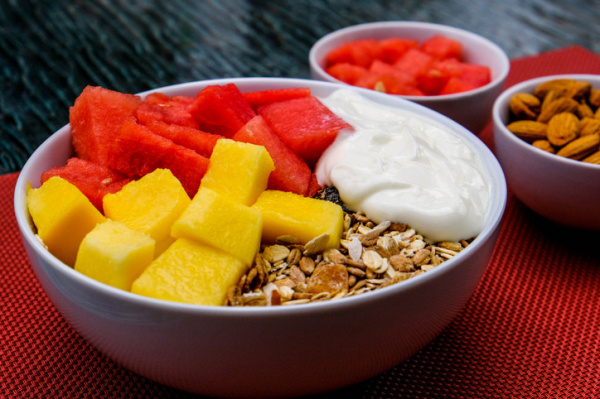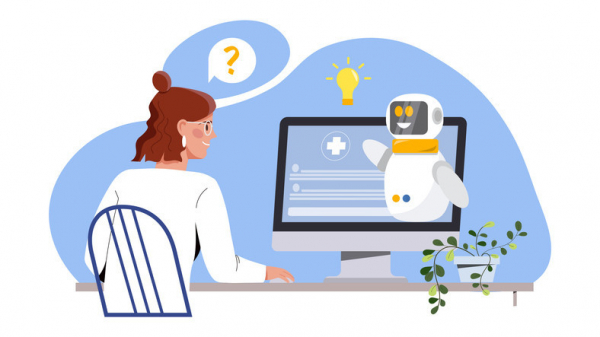
How — and why — to fit more fiber and fermented food into your meals

An F may mean failure in school, but the letter earns high marks in your diet. The two biggest dietary Fs — fiber and fermented foods — are top priorities to help maintain healthy digestion, and they potentially offer much more. How can you fit these nutrients into meals? Can this help your overall health as well as gut health?
Fiber, fermented foods, and the gut microbiome
The gut microbiome is a composed of bacteria, viruses, fungi, and other microorganisms living in the colon (large intestine). What you eat, the air you breathe, where you live, and many other factors affect the makeup of the gut microbiome. Some experts think of it as a hidden organ because it has a role in many important functions of the body — for example, helping the immune system function optimally, reducing chronic inflammation, keeping intestinal cells healthy, and providing some essential micronutrients that may not be included in a regular diet.
Your gut communicates with your brain through pathways in the gut-brain axis. Changes in the gut microbiome have been linked with mood and mental health disorders, such as depression and anxiety. However, it’s not yet clear that these changes directly cause these types of problems.
We do know that a healthy diet low in processed foods is key to a healthy gut microbiome. And increasing evidence suggests that fiber and fermented foods can play important parts here.
Fiber 101
Fiber’s main job is to make digestion smoother by softening and adding bulk to stool, making it pass quickly through the intestines.
But fiber has other benefits for your microbiome and overall health. A high-fiber diet helps keep body weight under control and lowers LDL (bad) cholesterol levels. Research has found that eating enough fiber reduces the risk of heart disease, type 2 diabetes, and some cancers.
What to know about fiber
There are two types of fiber: insoluble (which helps you feel full and encourages regular bowel movements) and soluble (which helps lower cholesterol and blood sugar). However, recent research suggests people should focus on the total amount of fiber in their diet, rather than type of fiber.
If you’re trying to add more foods with fiber to your diet, make sure you ease into new fiber-rich habits and drink plenty of water. Your digestive system must adapt slowly to avoid gas, bloating, diarrhea, and stomach cramps caused by eating too much too soon. Your body will gradually adjust to increasing fiber after a week or so.
How much fiber do you need?
The fiber formula is 14 grams for every 1,000 calories consumed. Your specific calorie intake can vary depending on your activity levels.
“But instead of tracking daily fiber, focus on adding more servings of fiber-rich foods to your diet,” says Eric Rimm, professor of epidemiology and nutrition at Harvard’s T.H. Chan School of Public Health.
Which foods are high in fiber?
Fruits, vegetables, legumes, nuts, seeds, and whole grains are all high in fiber. The Dietary Guidelines for Americans has a comprehensive list of fiber-rich foods and their calorie counts.
What about over-the-counter fiber supplements that come in capsules, powders that you mix with water, and chewable tablets? “If you have trouble eating enough fiber-rich foods, then these occasionally can be used, and there is no evidence they are harmful,” says Rimm. “But they should not serve as your primary source of dietary fiber.”
Fermented foods 101
Fermented foods contain both prebiotics — ingredients that create healthy changes in the microbiome — and beneficial live bacteria called probiotics. Both prebiotics and probiotics help maintain a healthy gut microbiome.
What to know about fermented foods
Besides helping with digestion and absorbing vital nutrients from food, a healthy gut supports your immune system to help fight infections and protect against inflammation. Some research suggests that certain probiotics help relieve symptoms of gut-related conditions like inflammatory bowel disease and irritable bowel syndrome, though not all experts agree with this.
Many foods that are fermented undergo lacto-fermentation, in which natural bacteria feed on the sugar and starch in the food, creating lactic acid. Not only does this process remove simple sugars, it creates various species of good bacteria, such as Lactobacillus or Bifidobacterium. (Keep in mind that some foods undergo steps that remove probiotics and other healthful microbes, as with beer or wine, or make them inactive, like baking and canning.)
The exact amounts and specific strains of bacteria in fermented foods vary depending on how they are made. In addition to probiotics, fermented foods may contain other valuable nutrients like enzymes, B vitamins, and omega-3 fatty acids.
How often should you eat fermented foods?
There is no recommended daily allowance for prebiotics or probiotics, so it is impossible to know precisely which fermented foods or quantities are best. The general guideline is to add more to your daily diet.
Which fermented foods should you choose?
Fermented foods have a range of tastes and textures because of the particular bacteria they produce during fermentation or that are added to foods. Yogurt is one of the most popular fermented foods (look for the words “live and active cultures” on the label). Still, many options are available if you are not a yogurt fan or want to expand your fermented choices. Kimchi, sauerkraut, kombucha, and pickles are a few examples.
As with fiber, probiotics are also marketed as over-the-counter supplements. However, like all dietary supplements, they do not require FDA approval, so there is no guarantee that the types of bacteria listed on a label can provide the promised benefits — or are even in the bottle. “Therefore, it is best to get your probiotics from fermented foods,” says Rimm.
To learn more about the value of fiber, fermented foods, and a healthy gut microbiome, listen to this episode of the Food, We Need to Talk podcast, “Understanding the Microbiome.”
About the Author

Matthew Solan, Executive Editor, Harvard Men's Health Watch
Matthew Solan is the executive editor of Harvard Men’s Health Watch. He previously served as executive editor for UCLA Health’s Healthy Years and as a contributor to Duke Medicine’s Health News and Weill Cornell Medical College’s … See Full Bio View all posts by Matthew Solan
About the Reviewer

Howard E. LeWine, MD, Chief Medical Editor, Harvard Health Publishing
Dr. Howard LeWine is a practicing internist at Brigham and Women’s Hospital in Boston, Chief Medical Editor at Harvard Health Publishing, and editor in chief of Harvard Men’s Health Watch. See Full Bio View all posts by Howard E. LeWine, MD

Can AI answer medical questions better than your doctor?

Last year, headlines describing a study about artificial intelligence (AI) were eye-catching, to say the least:
- ChatGPT Rated as Better Than Real Doctors for Empathy, Advice
- The AI will see you now: ChatGPT provides higher quality answers and is more empathetic than a real doctor, study finds
- Is AI Better Than A Doctor? ChatGPT Outperforms Physicians In Compassion And Quality Of Advice
At first glance, the idea that a chatbot using AI might be able to generate good answers to patient questions isn’t surprising. After all, ChatGPT boasts that it passed a final exam for a Wharton MBA, wrote a book in a few hours, and composed original music.
But showing more empathy than your doctor? Ouch. Before assigning final honors on quality and empathy to either side, let’s take a second look.
What tasks is AI taking on in health care?
Already, a rapidly growing list of medical applications of AI includes drafting doctor’s notes, suggesting diagnoses, helping to read x-rays and MRI scans, and monitoring real-time health data such as heart rate or oxygen level.
But the idea that AI-generated answers might be more empathetic than actual physicians struck me as amazing — and sad. How could even the most advanced machine outperform a physician in demonstrating this important and particularly human virtue?
Can AI deliver good answers to patient questions?
It’s an intriguing question.
Imagine you’ve called your doctor’s office with a question about one of your medications. Later in the day, a clinician on your health team calls you back to discuss it.
Now, imagine a different scenario: you ask your question by email or text, and within minutes receive an answer generated by a computer using AI. How would the medical answers in these two situations compare in terms of quality? And how might they compare in terms of empathy?
To answer these questions, researchers collected 195 questions and answers from anonymous users of an online social media site that were posed to doctors who volunteer to answer. The questions were later submitted to ChatGPT and the chatbot’s answers were collected.
A panel of three physicians or nurses then rated both sets of answers for quality and empathy. Panelists were asked “which answer was better?” on a five-point scale. The rating options for quality were: very poor, poor, acceptable, good, or very good. The rating options for empathy were: not empathetic, slightly empathetic, moderately empathetic, empathetic, and very empathetic.
What did the study find?
The results weren’t even close. For nearly 80% of answers, ChatGPT was considered better than the physicians.
- Good or very good quality answers: ChatGPT received these ratings for 78% of responses, while physicians only did so on 22% of responses.
- Empathetic or very empathetic answers: ChatGPT scored 45% and physicians 4.6%.
Notably, the length of the answers was much shorter for physicians (average of 52 words) than for ChatGPT (average of 211 words).
Like I said, not even close. So, were all those breathless headlines appropriate after all?
Not so fast: Important limitations of this AI research
The study wasn’t designed to answer two key questions:
- Do AI responses offer accurate medical information and improve patient health while avoiding confusion or harm?
- Will patients accept the idea that questions they pose to their doctor might be answered by a bot?
And it had some serious limitations:
- Evaluating and comparing answers: The evaluators applied untested, subjective criteria for quality and empathy. Importantly, they did not assess actual accuracy of the answers. Nor were answers assessed for fabrication, a problem that has been noted with ChatGPT.
- The difference in length of answers: More detailed answers might seem to reflect patience or concern. So, higher ratings for empathy might be related more to the number of words than true empathy.
- Incomplete blinding: To minimize bias, the evaluators weren’t supposed to know whether an answer came from a physician or ChatGPT. This is a common research technique called “blinding.” But AI-generated communication does not always sound exactly like a human, and the AI answers were significantly longer. So, it’s likely that for at least some answers, the evaluators were not blinded.
The bottom line
Could physicians learn something about expressions of empathy from AI-generated answers? Possibly. Might AI work well as a collaborative tool, generating responses that a physician reviews and revises? Actually, some medical systems already use AI in this way.
But it seems premature to rely on AI answers to patient questions without solid proof of their accuracy and actual supervision by healthcare professionals. This study wasn’t designed to provide either.
And by the way, ChatGPT agrees: I asked it if it could answer medical questions better than a doctor. Its answer was no.
We’ll need more research to know when it’s time to set the AI genie free to answer patients’ questions. We may not be there yet — but we’re getting closer.
Want more information about the research? Read responses composed by doctors and a chatbot, such as answers to a concern about consequences after swallowing a toothpick.
About the Author

Robert H. Shmerling, MD, Senior Faculty Editor, Harvard Health Publishing; Editorial Advisory Board Member, Harvard Health Publishing
Dr. Robert H. Shmerling is the former clinical chief of the division of rheumatology at Beth Israel Deaconess Medical Center (BIDMC), and is a current member of the corresponding faculty in medicine at Harvard Medical School. … See Full Bio View all posts by Robert H. Shmerling, MD